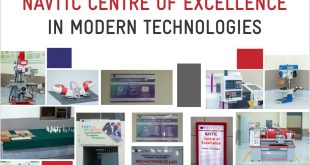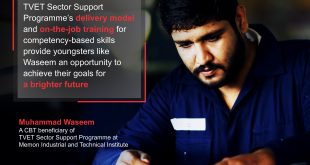“This is my visiting card; you can contact me round the clock,” says an excited Muhammad Saleem Mughal the moment a keen onlooker comes to a halt in front of his stall. Saleem is an internationally renowned craftsman with extraordinary skills in wood art. He has displayed his masterpieces for public viewing at an exhibition and knows it is a rare occasion where he can meet admirers of this art in large numbers.
 Hailing from Gujranwala, Saleem manages a small museum in his city where he keeps replicas of the work he produces for his local and international clients. The Quranic verses and holy transcripts carved out of wood are also on display. Saleem mostly uses teak wood for his craft, which includes models of construction projects, building structures, inscriptions, portraits, etc. A single piece takes anywhere from two months to more than two years to complete.
Hailing from Gujranwala, Saleem manages a small museum in his city where he keeps replicas of the work he produces for his local and international clients. The Quranic verses and holy transcripts carved out of wood are also on display. Saleem mostly uses teak wood for his craft, which includes models of construction projects, building structures, inscriptions, portraits, etc. A single piece takes anywhere from two months to more than two years to complete.
He is so involved in his work that he has little time to market it. No doubt an exhibition like this is a great promotional tool for him. A few yards from Saleem’s stall sits Muhammad Ejaz, a middle-aged artisan whose expertise is truck art.
He holds a piece of crockery close to his chest and carefully paints it with a brush specially designed for the purpose. He has drawn some food items on the piece and the colours look interestingly familiar: they are the vibrant hues one usually finds emblazoned on the bodies of commercial trucks all over Pakistan.
Here, this colour scheme adorns decoration pieces, frames, crockery items, lanterns, and other assorted paraphernalia – each one more eye-catching than the last.
Saleem and Ejaz are two of the 150 or so master craftspersons assembled from across Pakistan to display (and even sell) their wares at the Lahore Heritage Museum (Old Tollinton Market) at the Mall, Lahore.

The exhibition is part of a comprehensive project to help master artisans of the country make linkages with the market and train the next generation to keep these arts alive. Executed by the Sungi Development Foundation, the venture is supported by international donors, the European Union (EU), the Embassy of the Kingdom of the Netherlands and the Federal Republic of Germany, through the TVET Reform Support Programme, implemented by the GIZ.
Titled “Creating Opportunities for Skilled Artisans and Workers,” the project intends to provide training to 768 marginalised craftpersons/artisans, especially those from lower-income groups in rural districts, explains Mahmood Akhtar, Communication & Media Coordinator of the Sungi Development Foundation.
 The beneficiaries, he says, are mostly home-based workers living in far-flung areas of the country with limited or no links to the big markets. Quite often they are unaware of who buys their products or even that the lion’s share of the profit goes to the middlemen.
The beneficiaries, he says, are mostly home-based workers living in far-flung areas of the country with limited or no links to the big markets. Quite often they are unaware of who buys their products or even that the lion’s share of the profit goes to the middlemen.
The artisans targeted under the project have been selected from different areas and fields of work such as embroidery, Balochi crafts, Hunza crafts, block printing, ajrak, jisti/phulkari, gota kinari, chunri/tie & dye, Swati woolen shawls, khes, khaddar, sussi, lungi, gabba work, carpet weaving, daree weaving, lacquer art, woodwork, blue pottery, ceramics, paper mache, beadwork, basketry, camel bone work, metalwork, truck art, and stone carving.
They have been flown in and given a display area at absolutely no cost to them. Lubna Tariq, an artisan from Haripur, terms the availability of display options a blessing for craftspersons. She says that they cannot afford to pay the huge amounts for stalls at exhibitions put on by export centers and five-star hotels. “Why can’t the government provide permanent spaces to qualified artisans for free or at a nominal fee?” she questions.
 Lubna has sold dozens of hand-embroidered suits and hardly wasted any time on negotiating with visitors over prices. She claims she quotes reasonable prices so there is little room for haggling. Sales, however, are not her sole objective.
Lubna has sold dozens of hand-embroidered suits and hardly wasted any time on negotiating with visitors over prices. She claims she quotes reasonable prices so there is little room for haggling. Sales, however, are not her sole objective.
“I have exchanged contacts with some people who intend to enter into joint ventures with me in the near future,” she elaborates Muhammad Kaleem Rajput is another beneficiary whose work is selling like hotcakes. Awarded the UNESCO-South Asian Seal of Excellence in 2007 at Lok Virsa, Islamabad, he excels in traditional Multani glasswork called Multani Minakari.
Earlier, his products were considered old-fashioned; but now, thanks to the training he received through the project on how to modernize his craft, his clientele is expanding rapidly. Mrs Hina Kaleem, his wife, is also an expert in the art and is excited about receiving a large number of orders. “Earlier, we knew we could only produce work for installation in mosques, etc. Our designs were purely for our rural clientele,“ she reveals. “Today, we are working on current trends that meet the demands of the urban and international markets.” The modernity in their art is just one of the upshots of the training these artisans received through the Sungi project.
Mahmood points out some of the other skills the trainees were imparted (with the support of the project partners, Daachi Foundation and Beaconhouse National University): group management, skill development (or enhancement), colour scheming, product design and development, quality control, pricing, raw material purchase, marketing as well as the economic rights of home-based/informal workers, their health for sustainable improvement in their earnings, etc.
 Learning, however, wasn’t the only thing on the agenda.
Learning, however, wasn’t the only thing on the agenda.
“Encouraging the younger generations to take up these arts is another major focus area of the project,” says Kalsoom Akhtar, Project Coordinator of the Enterprise Development Program at Sungi. To achieve this end, she says, the master artisans were asked to train five students each in their respective fields of expertise, preferably in their localities.
They were offered a financial incentive in the form of a stipend on the completion of these trainings. This way, the project nurtured not just skill development, but skill longevity as well.
 Pakistan TVET REFORM Support Programme Technical and Vocational Education and Training (TVET) Reform support Programme
Pakistan TVET REFORM Support Programme Technical and Vocational Education and Training (TVET) Reform support Programme









